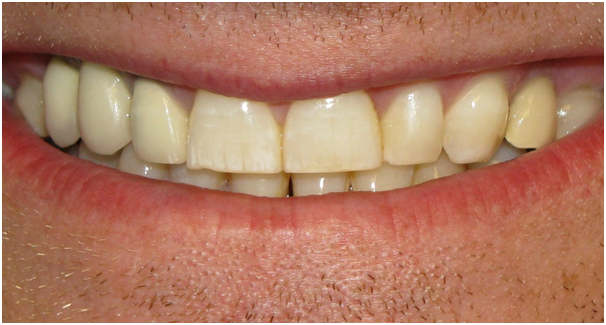Toothwear
Tooth wear is on the increase! As we live longer, our teeth are exposed to more damage from our diet and tooth grinding due to stress and anxiety.
What is tooth wear?
Tooth wear or Tooth Surface loss is the condition that refers to the loss of tooth that is not caused by decay or trauma.Most patients will have some minor tooth wear which generally does not cause any problems, however there are increasing groups of patients showing accelerated tooth wear that may lead to:
- Sensitivity
- Poor appearance of teeth (yellow, short and thin teeth)
- Difficulty with chewing
- Broken or sharp teeth
What are the causes of tooth wear?
- Erosion – this is the process in which the tooth dissolves from excessive consumptions of acidic foods and drink. For example Alcohol, carbonated (fizzy drinks including diet fizzy drinks and fizzy water), fruit juice, citrus fruit, fruit flavoured teas, flavoured waters and vinegar. Erosion can also occur with certain medical conditions such as eating disorders and reflux of stomach acid.
- Attrition – this results from the repeated clenching and grinding of teeth (bruxism). Most people are unaware that they grind their teeth and usually occurs when they sleep.
- Abrasion – this is normally caused by vigorous tooth brushing and nail biting.
What can be done to prevent tooth wear?
This is the most important step. Prevention is key. It is important to think about lifestyle and make diet changes to address any potential causes of tooth wear.
Patients suffering with tooth wear should brush daily with a toothpaste containing fluoride and the use of fluoride mouthwash is beneficial, but only to be used a separate time to brushing. The use of fluoride toothpaste can help protect the tooth surface as well as manage any sensitivity you may be experiencing.
If you clench or grind your teeth, you will certainly benefit from having a nightguard or splint made by your dentist. These splints can wear over time and will need replacement but this is better than further wear of your teeth.
If you suffer from reflux of stomach acid it is recommended you see your GP and if you do have repeated episodes of vomiting, it is important to avoid brushing straight after as this can increase the toothwear.
How do I know if I require treatment?
Not all patients with toothwear require treatment, especially if their cases are mild. Toothwear of this manner is normally monitored. When toothwear is advanced treatment is often required to prevent further toothwear and improve the dental appearance for the patient.
What kinds of treatment are available?
With a shift towards minimally invasive dentistry, teeth can be built up with composite restoration (white fillings). These are a good option as they generally do not require preparation to existing to the tooth surface and can be replaced and repaired easily. Studies show that these restorations usually work well over a 5-7 year period before replacement.
Where there are severely worn teeth, treatment options such as veneers or crowns may be recommended. Placement of crowns does require some preparation to the existing tooth and therefore this option could be considered slightly more invasive compared to the composite restorations.

Image shows patient suffering from tooth wear of their upper front teeth. The edges are flat and some minor chipping can be seen. This can be of cosmetic concern to the patient.
Dr Amit Patel BChD MJDF RCS (ENG) DIP IMP DENT RCS (ENG) MCLINDENT Fixed & Removable Prosthodontics Dist. (LON)


